In her essay “Poetry and Public Mourning,” Marilyn Hacker writes, “The Israeli poet Avot Yeshurun wrote that, if the response to atrocity is ‘Never Again,’ something in the human world may change; if it is ‘Never Again To Us,’ the ‘we’ in question and whomever ‘we’ encounter will be doomed to risk, to suffer, and to perpetrate atrocity anew.” In the phrase “Never Forget What They Did,” printed on plastic grocery bags in Manhattan, she hears a memorialization of the perpetrators, not the victims.
Milan Kundera recalls having met those who “had spent their youth in the Terezin concentration camp … For love of their own lives, they refused to be transformed into legends … What did art mean to them? It was the way to keep fully deployed the whole range of feeling and thought so that life should not be reduced to the single dimension of horror … who cared not a damn about immortalizing their torturers.”
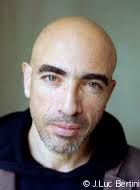 The grievous continuity between the 20th century catastrophes of Europe and the serial wars and regional conflicts of the post-Cold War metastasizes inexorably into the language and vision of He and I, poems by Emmanuel Moses, selected from his three most recent books and translated from the French by Hacker. Now 51, Moses was born in Casablanca to a French-educated German Jew and a French Jew of Polish descent. He spent his childhood in France, lived in Israel for 15 years and studied history at the Hebrew University of Jerusalem, and now lives in Paris. Hacker describes him as “a polyglot … a kind of poète sans frontières. While some contemporary French poets eschew geographical specificity, a perennial subject of Moses’ poems is the crossing and the porosity of actual borders, geographical and temporal.”
The grievous continuity between the 20th century catastrophes of Europe and the serial wars and regional conflicts of the post-Cold War metastasizes inexorably into the language and vision of He and I, poems by Emmanuel Moses, selected from his three most recent books and translated from the French by Hacker. Now 51, Moses was born in Casablanca to a French-educated German Jew and a French Jew of Polish descent. He spent his childhood in France, lived in Israel for 15 years and studied history at the Hebrew University of Jerusalem, and now lives in Paris. Hacker describes him as “a polyglot … a kind of poète sans frontières. While some contemporary French poets eschew geographical specificity, a perennial subject of Moses’ poems is the crossing and the porosity of actual borders, geographical and temporal.”
Spare and plaintive, at times bitter and stern, Moses’ poetry speaks in communion with those writers revered by his scholar-father: Benjamin, Celan, Levinas, Rosensweig. Other voices echo here: Desnos, Jabès – the surrealism of yearning and the disembodied yet bristling dialogues of ghost-selves. If the title He and I seems to evoke Martin Buber’s I and Thou, it also absorbs such philosophy into the looming problem of how to speak to one’s own deteriorated self, as well as any He whom I resemble. Here is the opening poem:
SMALL i
Small I suffers and muddles
a sky-blue thread stripes his heart
as if his eye had leaked into it
he wails he vomits himself up
little master Small i
scarlet with anger
at his intestinal torpor
a yellow broom bush by the tracks
no longer calms Small I down
nor purple shrubs the wind abandons
between glistening puddles
and yet Small i once was
complicit with the world
had all the elbow room he needed
at its all-night cafeteria
Hacker points out Moses’ ironic tone, “at moments meant to be self-reflective or romantic, an irony applied to the events of history as readily as to the events of a single young or aging man’s life.” History diminishes the legitimacy of self-identity, but the man responds by absorbing history into himself – the macabre proportions of displacement. Moses has created a character named Mr. Nobody – not so far removed from Herbert’s Mr. Cogito – though Moses’ character makes the division into self-aspects his subject:
MR. NOBODY SPEAKS TO HIS VOICE
Voice, you sprouted like a shrub
year after year:
I remember your first fragility,
touching frailty they’d do anything to protect
then the sudden, succeeding roughness
with a vigor no one would have thought you had.
Where was the foliage of your songs and fries?
You were naked then as those black skeletons lined up on winter roads
between snow-covered fields.
When you cradled infant ears and the exquisite ones of the beloved
bringing sleep to one and the other
it seemed you had reached your golden age
which, like the poets, you thought would never end.
But soon noises still unknown to you, pleas, moans, sighs
glided into you like hands into someone else’s gloves.
As well as you could, you put up with them, you claimed them,
they became your attributes, your weapons,
and other women murmured that you were gentle
in the night after love’s long commotion.
When the time comes when you tremble like a string
that has shot its arrow toward the target,
when you are chipped, crumbled, broken,
when you caw, croak pitifully,
console yourself, tell yourself that at the end of the cold, dark corridor
shines your immortal soul: silence.
Moses shows a prevailing impulse to smudge his own voice, to remind himself of powerlessness – perhaps to prevent sententiousness, as if it were a nagging temptation. Each line, bearing a syntactical unit, generates the sense of statement. In this way, one hears the checked urge to be precise about what is blurred – and occasionally, a summing-up that can’t be helped, as in the opening lines of “Second Étude”:
We end up knowing one thing, then another
we’ve raised simplicity’s flag without really believing in it
because our complexity is unknown, not understood
we’d have to speak like a dying man
like someone on a station platform who
is taking leave of his beloved forever
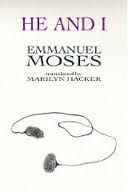 “Poetry speaks to the wound but not to the torturers,” said John Berger. Born into a reconstructed Europe and matured during globalization, Moses continues “to speak like a dying man” in his elegies – the one abandoned to live within the way things are. Although, as Hacker notes, his poems are often set in many different cities and countries, Emmanuel is not particularly interested in locale. His mode of address aspires to a lightness (sometimes yanked down by his own ironies) and a drift. In “Royal Blue” he writes, “Something unknown melts beneath our footsteps / the nights have left us nothing / photographs of what occurred are still discussed / but the history which prevails / is that of churches’ white roses.” Something dies away from us, a withdrawal of unaccomplished history: “a flower of silence as decoration.”
“Poetry speaks to the wound but not to the torturers,” said John Berger. Born into a reconstructed Europe and matured during globalization, Moses continues “to speak like a dying man” in his elegies – the one abandoned to live within the way things are. Although, as Hacker notes, his poems are often set in many different cities and countries, Emmanuel is not particularly interested in locale. His mode of address aspires to a lightness (sometimes yanked down by his own ironies) and a drift. In “Royal Blue” he writes, “Something unknown melts beneath our footsteps / the nights have left us nothing / photographs of what occurred are still discussed / but the history which prevails / is that of churches’ white roses.” Something dies away from us, a withdrawal of unaccomplished history: “a flower of silence as decoration.”
* * * * *
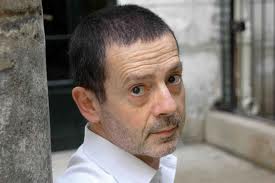 If Emmanuel Moses discovered his influential models through the literary passions of his European-educated father, Hédi Kaddour integrated a more broad variety of influences through his reading and travels. He was born in Tunis in 1945; his father was Tunisian, his mother was a French-speaking Algerian-born pied-noir. “He has lived in France since the age of eight, and French is his mother tongue,” writes Hacker. “His view of poetry, though, is that of a comparatist – of a reader owing no allegiance to a single language or a single poetics.” If Moses is a poète sans frontiers, Kaddour is a Parisian “writer-flaneur.”
If Emmanuel Moses discovered his influential models through the literary passions of his European-educated father, Hédi Kaddour integrated a more broad variety of influences through his reading and travels. He was born in Tunis in 1945; his father was Tunisian, his mother was a French-speaking Algerian-born pied-noir. “He has lived in France since the age of eight, and French is his mother tongue,” writes Hacker. “His view of poetry, though, is that of a comparatist – of a reader owing no allegiance to a single language or a single poetics.” If Moses is a poète sans frontiers, Kaddour is a Parisian “writer-flaneur.”
After serving in the French military in Morocco, he stayed there with his wife and daughters for twelve years, teaching French. In the late 80’s he returned to Paris and has lived there since, having made his living for years as a journalist and theater critic, and also translating German writers such as Durs Grünbein and Hans Magnus Enzenberger. He is the terse observer in a world of intersections – the newspaper converges with the stage play, and both of their speeches antagonize and abet the poet at his microphone:
SPIRITUAL DISTRESS
And damn the almanac makers who leave you
stuck between debts and death
or a week with seven tomorrows. Today
here’s another gent: History’s convulsions,
monstrous metaphor of our
spiritual distress. Listen to this, distress:
in Burgos, in the Middle Ages, a baker’s son
converted to Christianity, and his father,
in a fury, flung him into the oven.
Saint Mary, says the chronicle, saved the son, and
the citizens of Burgos burned the father and
don’t wander too far off, distress, and start to giggle
because what comes next is a riddle: my first is
a convoy of Jews sent to Auschwitz by
the Prefecture of the Gironde; my second, a procession
of bullet-bloated Algerians who float
under the pont Mirabeau; my third the funding
of the party in power in the sixties,
and together they make the proper name of a great
spiritual distress which is certainly not called
Martin Heidegger and don’t get annoyed, what’s annoying
is that all his should merely be allusion.
Like Moses, history for Kaddour is a continuous chronicle of malfeasance and terrors. What he objects to in the “gent’s” statement is the word “metaphor” – the convulsions are actual, not metaphoric, and when we speak of them they should not “merely be allusion.” It is difficult to accomplish this now. But mainly, Kaddour the flaneur moves about Paris, not alluding to the thuds of history, only to its residue. Many of his poems are suddenly viewed scenes, the eye creating its own anecdotes.
PLACE DE LA RÉPUBLIQUE
Nights of wet asphalt, drunk on Non,
Je ne regretted rien … the holiday donkey and lion
Revolve on the carousel facing the statue
Erect on its round plinth of bas-reliefs:
Waves of riders charge at Valmy.
With brusque movements a woman pulls
A whining child’s coat back on
And the Vengeur never stops sinking
On the thirteenth of Prairial while
On the revolving frieze above the animals
Boats from Geneva fill up
With satyrs come to ogle the heavy-
Breasted Republic, who counts her bums
And cops while dreaming up her aged future.
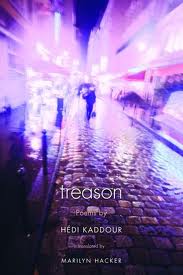 The Vengeur is the equivalent of the American’s “Remember the Maine!” Eventually these waning urgencies become annoying reminders of the need to find new outrages for revenge’s sake. The bums find a quiet place to piss somewhere down the Boulevard Magenta.
The Vengeur is the equivalent of the American’s “Remember the Maine!” Eventually these waning urgencies become annoying reminders of the need to find new outrages for revenge’s sake. The bums find a quiet place to piss somewhere down the Boulevard Magenta.
Hacker mentions several writers who influenced Kaddour – especially Joseph Brodsky whose essays in Far From Byzantium got him thinking about Akhmatova, Mandelstam, Cavafy and Walcott. But there is also French minimalist Jean Follain, the squinting observations of Borges, the Paris writings of Apollinaire, Prévert and Queneau, and just as with Moses, Paul Celan. But in Brodsky especially, Kaddour found ”something of a kindred spirit: a writer who had endured history’s horrors and vagaries but (or therefore) remained skeptical and independent of political and aesthetic pieties, steeped in the classical traditions of his own and other literatures while open to an absolute contemporaneity.” In “Tigers’ Gold,” a poem dedicated to Borges, he writes:
As for us, when we spill our coffee, we say
that we were clumsy and that it brings
good luck, we so much want our gaze
to be the pit in which our doubts hurl themselves …
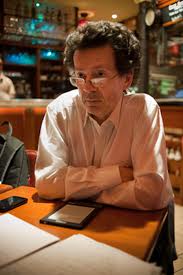 Again, as Hacker says, “Kaddour’s work combines an often surprising sensuality with erudition and wit, while it questions the structures of syntax itself and the limits of poetic form.” Certainly when compared to Moses, Kaddour is more unpredictable and playful, syntactically speaking. But the methods of both of these poets will appear very familiar to an English reader.
Again, as Hacker says, “Kaddour’s work combines an often surprising sensuality with erudition and wit, while it questions the structures of syntax itself and the limits of poetic form.” Certainly when compared to Moses, Kaddour is more unpredictable and playful, syntactically speaking. But the methods of both of these poets will appear very familiar to an English reader.
Moses Emmanuel has published eight books of poems. Hédi Kaddour has published seven, plus three novels, including Waltenberg which won both the Prix du Premier Roman (2005) and the Goncourt du Premier Roman (2006) – but which was overshadowed, in its English language debut, by Jonathan Littell’s The Quiet Ones, as if American readers have patience for only one momentous French novel in a given year. We have Marilyn Hacker to thank for making these important poets accessible to us.
* * * * *
He and I is published by Oberlin College Press, October 5, 2010. 80 pages, $15.95 paperback.
Treason is published by Yale University Press, April 6, 2010. 168 pages, $26.00 hardcover.
Marilyn Hacker’s essay “Poetry and Public Mourning” is included in Unauthorized Voices: Essays on Poets and Poetry, 1987-2009, published by the University of Michigan Press, November 1, 2010. 207 pages, $29.95 paperback. Her prefaces to both the Emmanuel and Kaddour collections may be found there as well.